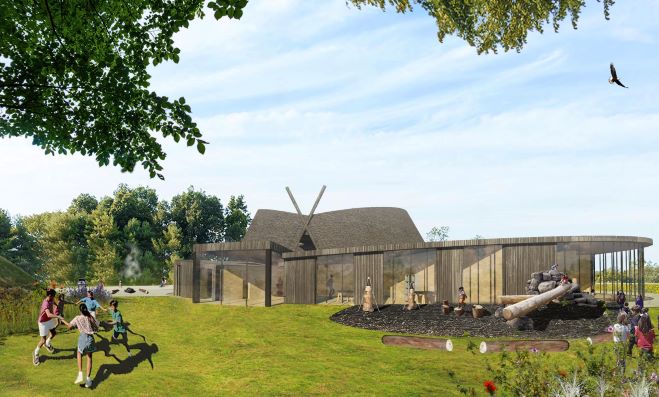Next steps taken for the Kenhtè:ke Language and Cultural Centre on Tyendinaga territory

The Kenhtè:ke Language and Cultural Centre centre is set to be open sometime in 2023-2024. Photo courtesy of Tsi Tyónnheht Onkwawén:na
BELLEVILLE – Another step has been taken in the creation of a new cultural centre on Tyendinaga Mohawk territory.
The proposed centre, called the Kenhtè:ke (Mohawk) Language and Cultural Centre will be a sustainable and accessible place for Tsi Tyónnheht Onkwawén:na’s language programs.
Tsi Tyónnheht Onkwawén:na, which means “keeping the words alive,” is a registered charity dedicated to providing education for children and adults on Tyendinaga Mohawk territory.
The centre would be a place for people young and old to learn the Mohawk language, play outside, and be engaged in the culture. It would be the headquarters for the organization.
Late last month, an announcement of who would do the design for the centre was made.
The Indigenous Design Studio of Brook McIlroy is a Toronto-based firm dedicated to diversity and sustainability in their work.
Callie Hill, executive director of TTO, said the project has been in the works since before COVID hit, but the pandemic threw a small wrench into the plans.
TTO applied for Infrastructure Canada’s Green and Inclusive Community Capital Grant Program in 2019 with a feasibility study.
High school students on-reserve worked with Number 9, a Toronto company, to render a 3D image of what the Centre would look like.

Hill says it was a great way to get the youth involved and interested in the project.
“We want to build this building very lightly on the land, and just be one with the land and not just be another four-walled structure sitting on the ground somewhere,” Hill says.
In the plans outlined so far, Hill says the building would make use of sustainable construction methods, be accessible to all, and have space for a medicine garden on-site.
There are less than 2,500 Mohawk language speakers across Canada. So far, 128 people have completed TTO’s adult language program.
“If our language and our culture is going to be sustained long term, we need to have a vast majority of people that are speaking and that are learning about who we are. And you know, we have to hang onto that for our children and our grandchildren,” Hill says.
According to Paul Latchford, manager of Indigenous Services at Loyalist College, language is essential to culture and to personal identity.
“That’ll give you that connection to your history, and backgrounds. Language is a key thing, don’t underestimate it,” Latchford says.
 Print This Post
Print This Post






